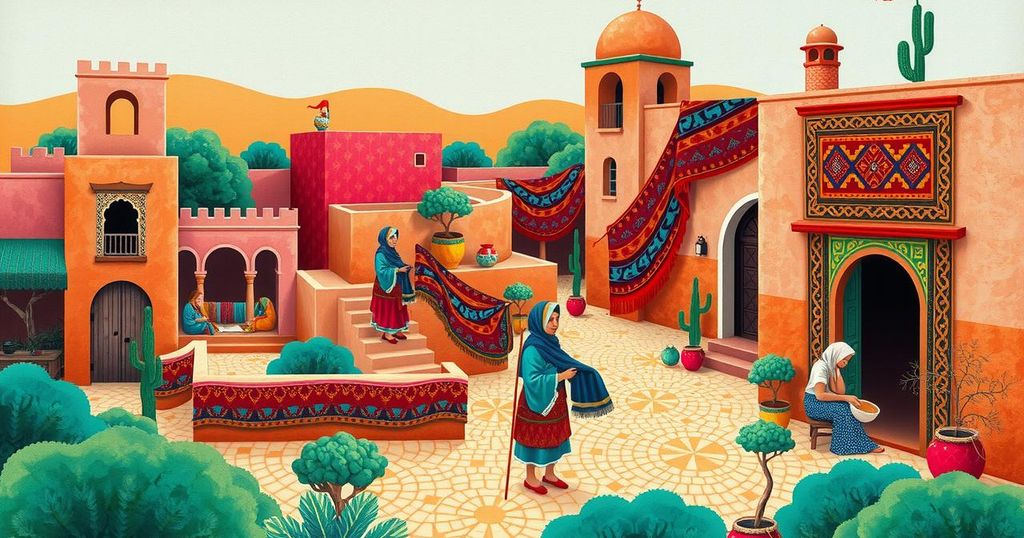King Mohammed VI’s inquiry regarding the role of women highlights a commitment to women’s rights in Morocco, yet substantial disparities persist. Despite some progress in gender equality, Morocco ranked 136th in the Global Gender Gap Index in 2022. Women’s political representation remains low, and numerous barriers continue to impede their full participation in public life. Addressing these issues is essential for true empowerment and societal progress.
On August 20, 1999, King Mohammed VI of Morocco posed a challenge about the role of women in society, questioning societal progress if half of the population’s interests are neglected. Moroccan women have reached competitive levels in education and workforce participation, yet they face systemic injustices that hinder their rights and status. This dual acknowledgment highlights both a commitment to women’s rights and persistent issues of discrimination in Moroccan society.
The persistent gender disparity in Morocco raises questions regarding its root causes—be it constitutional issues, the legal framework, cultural attitudes, or a deeply entrenched patriarchal system. To understand the situation better, it’s essential to evaluate the current status of women in Morocco, a quarter-century post-royal speech, examining their economic, political, and social contributions.
As of 2022, Morocco’s rank in the Global Gender Gap Index was 136th out of 146 countries. This alarming status stems from various issues, including political disinterest in women’s rights, widespread inequalities in poverty and literacy, limited economic empowerment, and high rates of violence against women. These factors hinder women’s advancement across multiple sectors.
Research from the Moroccan Organization for Family Justice in 2023 revealed that a staggering 86.32% of women have never run for office, with only 8.49% affiliated with political parties. In the 2021 elections, women occupied only 24% of parliamentary seats, 38.5% on regional councils, and 26% on local councils, despite women casting 54% of total votes, emphasizing that their support often doesn’t extend to female candidates.
Momentum for women’s political empowerment is gaining traction in Morocco, with constitutional measures promoting equality akin to international standards. The ratification of several conventions endorsing gender equality, such as CEDAW, and the implementation of anti-discrimination laws have emerged. Nonetheless, the actual representation of women remains significantly below global averages, exposing gaps between promises and reality.
Several obstacles contribute to women’s underrepresentation in politics, including perceptions of politics as intimidating, lack of confidence, exclusion from candidate lists, and accessibility to funding. The prevailing electoral environment, marked by corruption and negative practices, further discourages participation. Cultural attitudes and media representations reinforce traditional gender roles, limiting women’s public engagement.
To enhance women’s political presence, a reform of the Family Code is imperative, as family rights directly influence public participation. There’s a pressing demand for collective community engagement to shift cultural values towards democracy and equality. Educating young women about their political rights is crucial for fostering their involvement and equipping them for governance roles.
Economically, women’s roles have evolved, with a significant historical shift noted in 1997 when the first female ministers were appointed. Currently, women hold 19.86% of ministerial positions and represent 41.22% of civil service roles. However, their employment remains hindered, with an unemployment gap compared to men, compounded by family obligations and societal resistance.
In summary, while progress in women’s rights in Morocco is undeniable—fueled by activism and governmental acknowledgment—substantial barriers remain. To truly empower women, society must address these challenges, especially concerning their political involvement and their rightful participation in decision-making processes. The broader implications of enhancing women’s roles extend beyond rights; they are crucial for national development, economic advancement, and ethical governance.
Morocco has made strides in advancing women’s rights; however, significant barriers hinder true equality and empowerment. Continuous efforts must focus on addressing systemic challenges in political, economic, and social spheres to ensure women occupy meaningful roles. The societal acknowledgment of women’s contributions is vital for overall development, with their participation linked to improved governance and economic growth.
Original Source: www.moroccoworldnews.com






